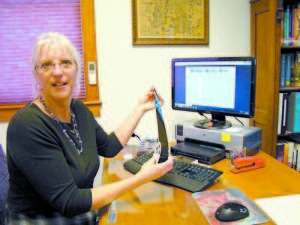Digital archiving up, running at BPL

Holly Hancock, librarian at Bridgton Public Library, holds a reel of microfilm that is obsolete now that back issues of the Bridgton News are being digitally archived, as shown on her computer monitor.
By Gail Geraghty
Staff Writer
Thanks to a grant from the Ham Foundation, the Bridgton Public Library’s website, www.bridgton.lib.me.us now contains a searchable database of back issues of The Bridgton News.
Genealogy researchers and history buffs will be able to read back issues at home or at the library and easily print out copies of obituaries and news articles, thanks to the $6,500 grant, said Librarian Holly Hancock.
Hancock wrote the grant nine months ago when the library’s microfilm reader broke down. The funds paid for the digitization of microfilm of the newspaper from 1870 to 2012, with the exception of the years 1963-1987, which were not placed on microfilm.
Within the next two weeks, the database will be updated to also include the first eight months of 2013. The library plans to continue updating back issues so that, on an ongoing basis, all but the previous month’s editions of The News will be accessible through the database, Hancock said.
“This is a huge resource for the community,†Hancock said. “The next step is to write a grant to get those missing years.†She said all that she needs to do to keep the service updated is to mail a DVD to the company she chose to provide the service, Advantage Preservation. The database company is also being used by libraries to archive local newspapers in Presque Isle and Damariscotta, she said.
The database is provided on Adobe Acrobat software, enabling the user to search by year or keyword, and allows a “snapshot†of the article to be copied with a click of the mouse button for later printing.
Digital archiving offers two major advantages over the old microfilm technology for archiving newspaper articles, she said. One, in transferring from microfilm, the images have been cleaned up by the company by adjusting the contrast and lighting; and two, users no longer have to come into the library to use it, scrolling painstakingly through an entire issue in order to find the desired information.
Another advantage of keywords is that the database provides a list of all instances within the newspaper when that word is used; whether it be someone’s name or a particular topic. The database uses Boolean search technology, so that users may narrow their search by placing quote marks at the beginning and end of words to call up the exact phrase or name.
“You can literally type in your name and find every time you’re listed in that paper,†Hancock said. “And it’s not place-based; you can be anywhere in the world†and obtain the information, she added.

